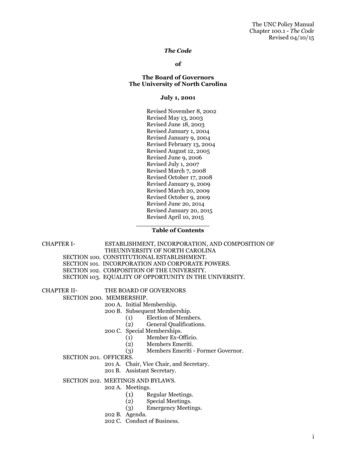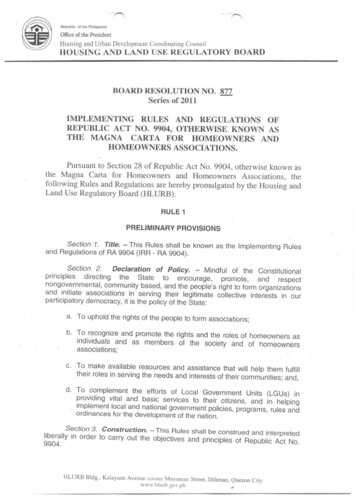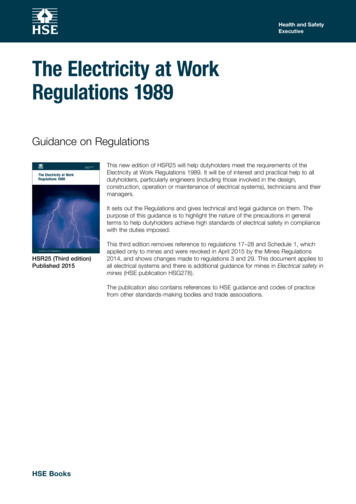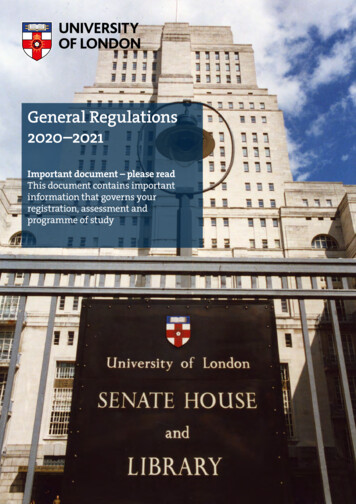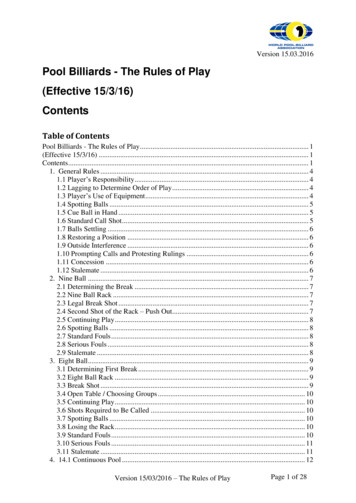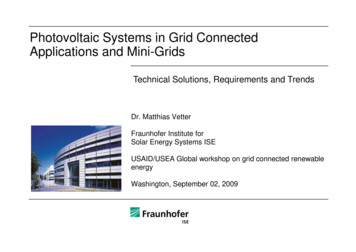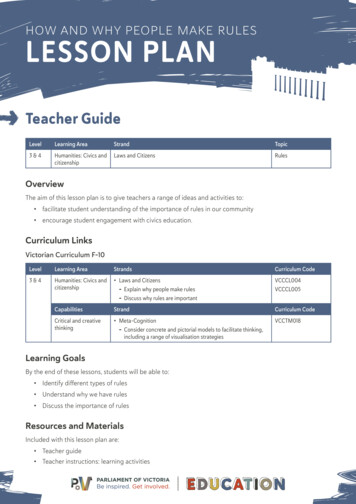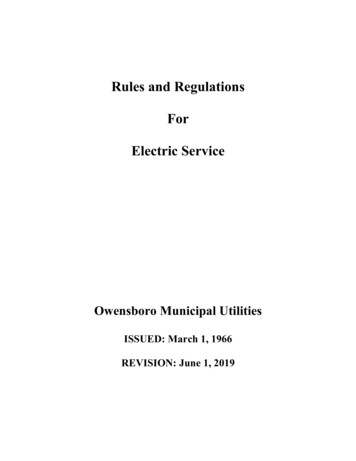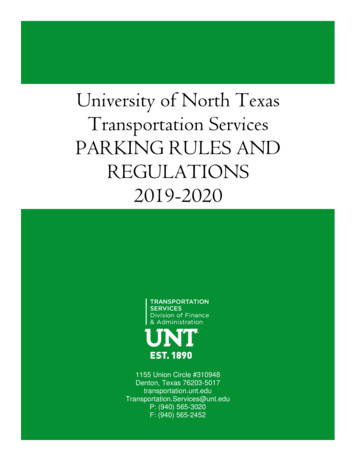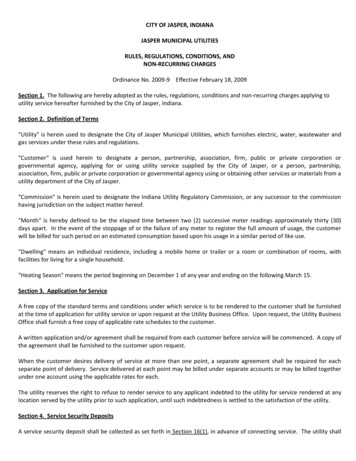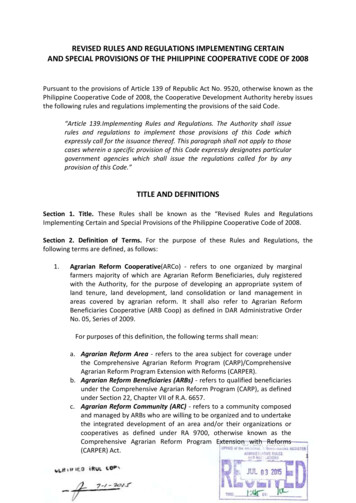
Transcription
REVISED RULES AND REGULATIONS IMPLEMENTING CERTAINAND SPECIAL PROVISIONS OF THE PHILIPPINE COOPERATIVE CODE OF 2008Pursuant to the provisions of Article 139 of Republic Act No. 9520, otherwise known as thePhilippine Cooperative Code of 2008, the Cooperative Development Authority hereby issuesthe following rules and regulations implementing the provisions of the said Code.“Article 139.Implementing Rules and Regulations. The Authority shall issuerules and regulations to implement those provisions of this Code whichexpressly call for the issuance thereof. This paragraph shall not apply to thosecases wherein a specific provision of this Code expressly designates particulargovernment agencies which shall issue the regulations called for by anyprovision of this Code.”TITLE AND DEFINITIONSSection 1. Title. These Rules shall be known as the “Revised Rules and RegulationsImplementing Certain and Special Provisions of the Philippine Cooperative Code of 2008.Section 2. Definition of Terms. For the purpose of these Rules and Regulations, thefollowing terms are defined, as follows:1.Agrarian Reform Cooperative(ARCo) - refers to one organized by marginalfarmers majority of which are Agrarian Reform Beneficiaries, duly registeredwith the Authority, for the purpose of developing an appropriate system ofland tenure, land development, land consolidation or land management inareas covered by agrarian reform. It shall also refer to Agrarian ReformBeneficiaries Cooperative (ARB Coop) as defined in DAR Administrative OrderNo. 05, Series of 2009.For purposes of this definition, the following terms shall mean:a. Agrarian Reform Area - refers to the area subject for coverage underthe Comprehensive Agrarian Reform Program (CARP)/ComprehensiveAgrarian Reform Program Extension with Reforms (CARPER).b. Agrarian Reform Beneficiaries (ARBs) - refers to qualified beneficiariesunder the Comprehensive Agrarian Reform Program (CARP), as definedunder Section 22, Chapter VII of R.A. 6657.c. Agrarian Reform Community (ARC) - refers to a community composedand managed by ARBs who are willing to be organized and to undertakethe integrated development of an area and/or their organizations orcooperatives as defined under RA 9700, otherwise known as theComprehensive Agrarian Reform Program Extension with Reforms(CARPER) Act.1
d. CLOA - refers to the Certificate of Land Ownership Award.e. DAR - refers to the Department of Agrarian Reform.f. Marginal Farmers - refers to farmers who are tilling an area of notmore than three (3) hectares.g. Next of Kin – for purposes of ARB cooperative succession, refers to anatural person who is an heir of an agrarian reform beneficiary and whois qualified to be a member of the cooperative under its By-laws and asdetermined by DAR.2.Alternative Dispute Resolution (ADR) - refers to a process or procedure usedto resolve a dispute or controversy, other than by adjudication of a presidingJudge of Court or an officer of a government agency, in which a neutral thirdparty participates to assist in the resolution of issues, which includesarbitration, mediation, conciliation, early neutral evaluation, mini trial, or acombination thereof.For purposes of this definition, the following terms shall mean:a. Arbitrator - refers to the person appointed to render an Award, in adispute that is the subject of an arbitration agreement.b. Award - refers to any partial or final decision by an Arbitrator inresolving the issues in a controversy.c. Conciliation - refers to the process whereby a neutral third party takesan active role in assisting disputants to formulate between and amongthemselves an acceptable solution to reach an amicable settlement.d. Dispute - refers to intra/inter cooperative controversy or grievancearising from any violation or disagreement over any provision of law,including violations of the rights and conditions of membershipprovided in the By-laws of the cooperative and/or in the CooperativeCode, which may be the subject of a formal or informal request forconciliation/mediation or arbitration assistance sought by eitherparties.e. Mediation –refers to the process wherein a mediator, selected by thedisputing parties, facilitates communication and negotiation, and assiststhe parties in reaching a voluntary agreement relative to the dispute.f. Settlement - refers to any compromise or agreements reached betweenthe disputants to settle the matters in dispute and thus dispose ofcontroversy.g. Submission Agreement - refers to the written agreement signed by thedisputing parties to submit the dispute to voluntary arbitration.h. Voluntary Arbitration- refers to a dispute resolution process whereinany intra/inter cooperative dispute is settled by a voluntary arbitrator/schosen by the disputing parties or appointed by the Authority from alist of accredited arbitrators, who shall render an Award.i. Voluntary Arbitrator/Arbitrators - refers to any accredited andauthorized employee of the Authority or an accredited private2
individual chosen by the parties or appointed by the Authority to hear,decide, and render an award in a dispute.3.4.5.6.7.8.9.Area of Operation - refers to the area where the cooperative operates andwhere its members come from as provided for in their Articles of Cooperationand By-laws.Articles of Cooperation - refers to the Articles of Cooperation of a registeredcooperative, including registered amendments thereto, if any.Associate Member - refers to a member of a cooperative who has no right tovote nor be voted upon and is entitled only to limited rights, privileges andmembership duration as provided in the By-laws of the cooperative, thePhilippine Cooperative Code of 2008, and its Implementing Rules andRegulation.Authority - refers to the Cooperative Development Authority (CDA).Bond of Membership - refers to the conditions where members groupthemselves to attain their common goals and objectives which may either beresidential, occupational, associational, or institutional.By-Laws - refers to the By-laws of a registered cooperative which includes itsregistered amendments, if any.Capital - refers to the totality of the members’ share capital, loans andborrowings including deposits, deferred payment of interest on share capitaland patronage refund, subsidies, donations, legacies, grants, aids, lands,structures, plants, equipment, facilities, machines and other assets of thecooperative.For purposes of this definition, the following terms shall mean:a. Authorized Share Capital - refers to the capitalization of thecooperative as provided in the Articles of Cooperation and as approvedby the Authority.b. Donated Capital - refers to the subsidies, grants, donations and aidsreceived by the cooperative from any person or institution, local orforeign. It shall form part of the capital of the cooperative.c. Equity - refers to the excess of cooperative assets over liabilities.d. Financial Statements - refer to the documents showing Statement ofFinancial Condition (Balance Sheet), Statement of Operation (IncomeStatement), Statement of Cash Flows, and Statement of Changes inEquity in a given period.e. Interest on Share Capital –refers to the interest earned by themembers’ paid up capital. It is computed by multiplying the rate ofinterest on share capital by members’ average shares. The rate ofinterest on share capital is computed by dividing the amount allocatedfor total interest on share capital by the total average share month.f. Net Surplus – refers to the excess payments made by members, whichshall not be construed as profits, from the loans or goods and servicesavailed of or the difference of the rightful amount due to the membersfor their products sold or services rendered to the cooperative. It3
g.h.i.j.k.l.m.n.o.includes other inflow of assets resulting from its other operatingactivities, which shall be returned to the members as prescribed in theCode.Net Worth - refers to equity inclusive of members’ equity, donations,grants and reserve funds less unbooked allowances for probable losseson loans, accounts receivable, investment and non-performing assetsand other capital adjustments as may be allowed by the Authority.Paid-up Share Capital - refers to the portion of a member’s sharecapital that has been paid.Patronage Refund - refers to the amount returned to the individualmembers in proportion to their individual patronage of thecooperative’s products and services.Revolving Capital - refers to the amount constituting the patronagerefund and interest on share capital of the members, the payment ofwhich has been deferred by the cooperative. A corresponding revolvingcapital certificate shall be issued to the members.Revolving Capital Certificate – refers to the certificate issued by theBoard of Directors of the cooperative indicating the serial number,name, amount, and rate of interest to be paid and shall distinctly setforth the time of retirement of such certificate and the amount to bereturned.Risk Asset - refers to the cooperative’s total assets less cash on hand,evidence of indebtedness, loans to the extent covered by hold-outs orassignments of deposits, lands owned used for operations, buildingsand land improvements net of depreciation, furniture and fixtures andequipment net of depreciation, real estate mortgage, loans and othernon-risk items as the Authority may, from time to time, authorize to bededucted from total assets.Share Capital - refers to the money paid or required to be paid by themembers for the conduct of the operations of the cooperative.Total Average Share Month – refers to the sum total of the averageshare month which is determined by adding the monthly endingbalances of a member’s share capital and dividing the sum by twelve(12) months.Unpaid Subscription - refers to a member’ sunpaid subscribed sharecapital.10. COC - refers to the Certificate of Compliance issued by the Authority to alltypes of cooperatives after compliance with the rules of the Authority.11. Code - refers to Republic Act No. 9520, otherwise known as the PhilippineCooperative Code of 2008.12. Cooperative Bank - refers to a cooperative organized primarily to provide awide range of financial services to cooperatives and their members.13. Credit Cooperative - refers to a cooperative that promotes thrift and wise useof money and undertakes savings and lending services among its members. Itgenerates a common pool of funds in order to provide financial assistance and4
14.15.16.17.other related financial services to its members for productive and providentpurposes.Dairy Cooperative - refers to a cooperative engaged in the production of freshmilk which may be processed and/or marketed as dairy products. All mattersrelating to the technical operations of the dairy business shall be supervised bythe following government agencies:a. NDA - refers to the National Dairy Authority.b. FDA - refers to the Food and Drugs Administration.c. DOH - refers to the Department of Health.Dissenting Member - refers to a member who votes against a proposedactivity/project of a cooperative.Division - refers to the act of splitting a single cooperative into two or morecooperatives, wherein the original cooperative shall be dissolved and theresulting cooperatives shall acquire separate and distinct juridical personalities.Electric Cooperative - refers to a cooperative organized primarily for thepurpose of undertaking power generation, utilizing renewable energy sources,including hybrid system, acquisition and operation of sub- transmission ordistribution to its household members.For purposes of this definition, the following terms shall mean:a. Distribution of Electricity - refers to the conveyance of electric powerby a distribution utility through its distribution system pursuant to theprovisions of the EPIRA Law.b. Distribution Utility - refers to any Electric Cooperative, privatecorporation, government-owned utility, or existing local governmentunit which has an exclusive franchise to operate a distribution system inaccordance with the EPIRA Law.c. EPIRA - refers to the Electric Power Industry Reform Act of 2001.d. Referendum - refers to a mechanism to secure the approval of thegeneral membership of an Electric Cooperative on issues relative to itsregistration, operation and management.e. Renewable Energy Resources - refer to energy resources such as, butnot limited to, biomass, solar, wind, hydro, geothermal and oceanenergy. These resources do not have an upper limit on the totalquantity of energy to be used and are renewable on a regular basis, therenewable rate of which is rapid enough to consider availability over anindefinite time.f. Sub-transmission Assets - refer to the facilities related to the powerdelivery service below the transmission voltages and based on thefunctional assignment of assets, including, but not limited to, step-downtransformers used solely by load customers, associatedswitchyard/substation, control and protective equipment, reactivecompensation equipment to improve customer power factor, overheadlines, and the land where such facilities / equipment are located. Theseinclude NPC assets linking transmission system and the distributionsystem which are neither classified as generation nor transmission.5
g. Supply of Electricity - refers to the sale of electricity by a party otherthan a generator or a distributor in the franchise area of a distributionutility using the wires of the distribution utility concerned.h. Transmission of Electricity - refers to the conveyance of electricitythrough the high voltage system.18. Escheat - refers to the power of the State to succeed to property, real orpersonal, for which there is no owner, heir or claimant.19. Extension Offices - refers to the regional offices of the Authority.20. Financial Service Cooperative (FSC) - refers to a cooperative organized for theprimary purpose of engaging in savings and credit services and enhancedfinancial services subject to the regulations of the Bangko Sentral ng Pilipinas(BSP).For purposes of this definition, the following terms shall mean:a. BSP - refers to the Bangko Sentral ng Pilipinas.b. Conservator - refers to any person appointed by the Authority,empowered to take charge of the assets, liabilities, and themanagement of the cooperative, after finding that the cooperative is ina state of continuing inability or unwillingness to maintain a conditionof liquidity which is deemed adequate to protect the interest ofmembers and creditors of the cooperative.c. Internal Control - refers to all the systems and procedures adopted tosafeguard the cooperative's assets, check the accuracy and reliability ofits accounting data, promote operational efficiency and encourageadherence to prescribed managerial policies.d. Receiver - refers to any person of recognized competence appointed bythe Authority and is empowered to take charge and administer all theassets and liabilities of the cooperative for the benefit of its creditorsand exercises such other powers as provided under the Revised Rules ofCourt.21. General Assembly –refers to the full membership of the cooperative dulyassembled for the purpose of exercising all the rights and performing all theobligations pertaining to cooperatives as provided by the Code, its Articles ofCooperation and By-laws.22. Housing Cooperative - refers to a cooperative organized to assist or provideaccess to housing for the benefit of its regular members who activelyparticipate in the savings program for housing. It is co-owned and controlled byits members.For purposes of this definition, the following terms shall mean:a. Blanket Loan/Wholesale Loan - refers to a housing loancontracted/obtained by a housing cooperative intended to identifymember-beneficiaries for land acquisition, land improvement, house6
b.c.d.e.f.g.h.i.j.k.l.m.n.o.construction, home improvement, or renovation and other similarpurposes.Cooperative Housing Program - refers to an alternative housingapproach, in partnership with government/non-government agenciesinvolved in a housing program, undertaken by a financially andorganizationally stable cooperative to address the housing problems ofits members, primarily the low-income earners, through its owncooperative efforts in planning and direct production of affordable,decent and adequate housing units.DBP –refers to the Development Bank of the Philippines.DENR –refers to the Department of Environment and NaturalResources.HDMF - refers to the Home Development Mutual Fund or Pag-IBIGFund.HGC –refers to the Home Guarantee Corporation.HLURB - refers to the Housing and Land Use Regulatory Board.HUDCC –refers to the Housing and Urban Development CoordinatingCouncil.Housing Beneficiaries - refer to regular members in good standing ofthe Housing Cooperative who actively participate in the savingsprograms for housing and qualify to own a unit as provided in the Bylaws and duly approved internal policies of the cooperative.LBP –refers to the Land Bank of the Philippines.NHA - refers to the National Housing Authority.SSS - refers to the Social Security System.Socialized Housing - refers to the housing program and projectundertaken by the government and private sector for theunderprivileged and homeless which may also be undertaken by aHousing Cooperative. This includes sites and services development,long-term financing and liberalized terms on interest payments.SHFC –refers to the Social Housing Finance Corporation.Technical Plan - refers to all technical documents required in planning ahousing project namely, the bar chart and construction schedule,systematic development plan, the architectural and detailedengineering and housing design, contract documents, technical andmaterial specification.22. Insurance Cooperative - refers to a cooperative engaged in the business ofinsuring life and property of the constituting cooperatives and their members.It shall also refer to Cooperative Insurance Societies (CIS).For purposes of this definition the following terms shall mean:a. Commission - refers to the Insurance Commission.b. Insurance-like Activity- refers to any activity involving regular collectionof premiums, fees, contributions, or charges prior to the occurrence ofcontingent event and the payment of guaranteed benefits upon the7
occurrence of such event. The term excludes risk pooling practices suchas “damayan” or “abuloy” system wherein an individual or group ofindividuals voluntarily pledge and contribute a certain amount ofmoney to a fund and the benefits are not pre-determined but arecontingent to the amounts collected.c. Micro-Insurance - refers to an activity providing specific insurance andother similar products and services that meet the needs of the lowincome sector for risk protection and relief against distress, misfortuneand other contingent events. This shall include all forms of insuranceand other similar activities, as may be defined by concerned regulatorybodies with features such as: premiums, contributions, fees or chargescollected/deducted prior to the occurrence of a contingent event andguaranteed benefits provided upon the occurrence of a contingentevent.d. Micro-Insurance Product - refers to a financial product or service thatmeets the risk protection needs of the poor where the amount ofpremiums, contributions, fees or charges computed on a daily basisdoes not exceed seven and a half percent (7.5%) of the current dailyminimum wage rate for non-agricultural workers in Metro Manila, asapproved by the National Wages Productivity Board (NWPB)/RegionalTripartite Wages Productivity Board (RTWPB), and the maximum sum ofguaranteed benefits is not more than 1,000 times the daily minimumwage rate for non-agricultural workers in Metro Manila.e. Regular Insurance Product - refers to all other insurance policies notcovered by Micro-Insurance Product.23. Laboratory Cooperative - refers to a cooperative duly recognized by theAuthority, formed and managed principally by minors and is affiliated withanother registered cooperative which is called the guardian cooperative.For purposes of this definition, the following terms shall mean:a. Guardian Cooperative - refers to a duly registered cooperative with whicha laboratory cooperative is affiliated.b. Minor - refers to an individual below eighteen (18) years of age.24. Labor Service Cooperative- refers to a cooperative organized primarily toengage in providing a specific work, job, or service to a principal under acontracting or subcontracting arrangement as may be defined under existinglaws and in accordance with the cooperative principles set forth under thePhilippine Cooperative Code of 2008 (RA 9520).25. Liquidation - refers to the process of settlement and closure of thecooperative affairs, disposition, conveyance and distribution of its assets.For purposes of this definition, the following terms shall mean:8
a. Voluntary Dissolution- refers to the termination of the juridicalpersonality of a cooperative at its own initiative or instance aftercomplying with the requirements set forth in the Code, these rules andissuances by the Authority.b. Involuntary Dissolution - refers to the termination of the juridicalpersonality of a cooperative through an appropriate judicial proceedingor by Order of the Authority.26. Member in Good Standing - refers to a regular member who is entitled tovote and to such other privileges as provided in the by-laws.27. Merger - refers to a union of two or more existing cooperatives belonging tothe same category whereby the surviving cooperative, retaining its identity,absorbs one or more constituent cooperatives/s.For purposes of this definition, the following terms shall mean:a. Certificate of Merger - refers to the document issued by the Authorityevidencing registration of merger.b. Consolidation - refers to a union of two or more existing cooperativesbelonging to the same category to form a new cooperative called theconsolidated cooperative.c. Constituent Cooperatives - refer to two or more existing cooperativeswhich are parties to a merger or consolidation.d. Plan of Merger or Consolidation - refers to a written documentcontaining the proposed merger or consolidation of cooperatives dulyapproved by the General Assembly of each of the constituentcooperatives at separate General/Representative Assembly Meetings.e. Registration - refers to the operative act granting juridical personality toa proposed cooperative as evidenced by a Certificate of Registration.28. Multipurpose Cooperative - refers to a cooperative, which combines two (2) ormore business activities.29. Primary Cooperative - refers to a cooperative, the members of which are naturalpersons. In case of electric and water service cooperatives, institutional usersmay be accepted as associate members.30. Regular Members –refer to one who has complied with all the membershiprequirements and is entitled to all the rights and privileges of membership.31. Reports - refer to any document or statement to be submitted regularly by thecooperative to the Authority.For purposes of this definition, the following term shall mean:a. Sanctions - refer to the penalties provided for in the by-laws of thecooperative, these Rules, and other administrative issuances of theAuthority, the Code and other related laws.9
32. Representative Assembly– refers to the full membership of the body ofrepresentatives elected from each of the sectors, chapters or districts of thecooperative, duly assembled for the purpose of exercising such powers lawfullydelegated by the general assembly in accordance with the By-laws of thecooperative.For purposes of this definition, the following terms shall mean:a. Election Deputies –refer to those members of the cooperative from thesector, chapter or district appointed by the election committee asapproved by the board of directors, tasked to facilitate the conduct ofthe election of the Representative/Delegate in their respective sector,chapter or district, in accordance with the By-laws of the cooperative,which shall not be more than five (5) for each sector, chapter, ordistrict.b. Representative/Delegate - refers to a member duly elected during thesector, chapter or district meetings who shall represent his/her sector,chapter or district to the representative assembly meeting.c. Numerous and Dispersed Membership - refers to a cooperative with alarge number of membership who are scattered/dispersed by reason ofgeographical location, work shift or other similar conditions making itimpossible and difficult to conduct its general assembly meeting.d. Sector, Chapter or District - refers to an aggrupation of a cooperativemembership, by reason of geographical location, work shift or othersimilar conditions.e. Sequential Election of Representative - refers to the election of therepresentatives during meetings held in sequence, in different daysand/or at various venues, by several sectors, chapters or districts of acooperative for the purpose of electing their respective Representativesto the representative assembly meeting.f. Simultaneous Election of Representative - refers to the election of therepresentatives during the meetings held, on the same day and atvarious venues, by several sectors, chapters, or districts of acooperative for the purpose of electing their respective Representativesto the representative assembly meeting.33. Service Cooperative – refers to a cooperative organized primarily to provide anytype of service to its members including, but not limited to, labor, transport,information and communication, insurance, housing, electric, health services,education, banking and savings, and credit.34. Secondary Cooperative - refers to a cooperative the members of which areprimary cooperatives.35. Subsidiary Cooperative - refers to a cooperative all or majority of whosemembership or shareholders come from a cooperative called a parentcooperative. It is organized for a purpose other than that of the parentcooperative, and receives technical, managerial, and financial assistance fromthe said parent cooperative.10
For purposes of this definition, the following term shall mean:a. Parent Cooperative - refers to a cooperative which organizes a subsidiaryand provides technical, managerial and financial assistance thereto.36. Tertiary Cooperative - refers to a cooperative, the members of which aresecondary cooperatives.37. Transportation Service Cooperative - refers to a cooperative organizedprimarily to provide land and sea/water transportation, provided thatsea/water transportation shall be limited to small vessels as defined underPhilippine Maritime laws.For purposes of this definition, the following terms shall mean:a. Accreditation - refers to the recognition extended by the OTC to aregistered Transportation Service Cooperative, as evidenced by aCertificate of Accreditation.b. CPCN / Franchise / Permit - refers to the Certificate of PublicConvenience and Necessity issued by the appropriate governmentagency.c. Cooperative Education and Transport Operation Seminar (CETOS) refers to seminars conducted by OTC for the purpose of providingcontinuing education on cooperative and transport service operationsto enhance the knowledge and capability of the officers and membersof the Transportation Service Cooperative.d. DILG –refers to the Department of the Interior and Local Government.e. DOTC - refers to the Department of Transportation andCommunications.f. LGU - refers to the Local Government Unit.g. LTFRB - refers to the Land Transportation Franchising and RegulatoryBoard.h. LTO - refers to the Land Transportation Office.i. MARINA - refers to the Maritime Industry Authority.j. OTC - refers to the Office of Transportation Cooperatives.k. PCG - refers to the Philippine Coast Guard.38. Water Service Cooperative - refers to a cooperative organized primarily toown, operate and/or manage water supply distribution system to serve itsmembers and their households.For purposes of this definition, the following terms shall mean:a. LWUA - refers to the Local Water Utilities Administration, created underPD 198, as amended.b. NWRB - refers to the National Water Resources Board, created underPD 424.11
c. Water Permit - refers to the authority to appropriate and use water,issued by the NWRB.d. Water Right - refers to the privilege granted by the government toappropriate and use water.e. Water Tariff - refers to the water rate charged for water consumptionas determined by the cooperative and approved by the NWRB.39. Workers Cooperative–refers to a cooperative organized primarily byworkers, including the self-employed, who are at the same time the memberowner of the enterprise, the purpose of which is to provide employment,business opportunities to its member-owners in accordance with thecooperative principles.PART ICERTAIN PROVISIONSRULE 1REPRESENTATIVE ASSEMBLYSection 1.Legal Basis. The Legal basis for this Rule is Article 5 (2), (10) of the Code, quoted asfollows:"(2) General Assembly shall mean the full membership of the cooperative dulyassembled for the purpose of exercising all the rights and performing all theobligations pertaining to cooperatives, as provided by this Code, its articles ofcooperation and by-laws. Provided; that for cooperatives with numerous anddispersed membership, the general assembly may be composed of delegateselected by each sector, chapter or district of the cooperative and inaccordance with the rules and regulations of the Cooperative DevelopmentAuthority."“(10) Representative Assembly means the full membership of the body ofrepresentatives elected by each of the sectors, chapter or district of thecooperative duly assembled for the purpose of exercising such powers lawfullydelegated unto them by the general assembly in accordance with its by-laws."Section 2.Coverage.These Rules shall apply to a cooperative opting to conduct its generalassembly meeting by way of representative assembly as provided for under Article 5 (2) and(10) of RA 9520.Sect
Code - refers to Republic Act No. 9520, otherwise known as the Philippine Cooperative Code of 2008. 12. Cooperative Bank - refers to a cooperative organized primarily to provide a wide range of financial services to cooperatives and their members. 13. Credit Cooperative - refers to a cooperative that promotes thrift and wise use
